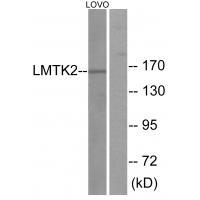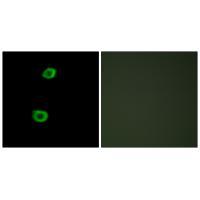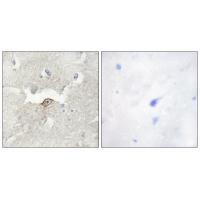


| WB | 咨询技术 | Human,Mouse,Rat |
| IF | 咨询技术 | Human,Mouse,Rat |
| IHC | 咨询技术 | Human,Mouse,Rat |
| ICC | 1/200 - 1/1000 | Human,Mouse,Rat |
| FCM | 1/200 - 1/400 | Human,Mouse,Rat |
| Elisa | 1/10000 | Human,Mouse,Rat |
| Aliases | 2900041G10Rik; BREK; cprk; EC 2.7.11.1; KIAA1079 |
| Entrez GeneID | 22853; |
| WB Predicted band size | 164kDa |
| Host/Isotype | Rabbit IgG |
| Antibody Type | Primary antibody |
| Storage | Store at 4°C short term. Aliquot and store at -20°C long term. Avoid freeze/thaw cycles. |
| Species Reactivity | Human,Mouse |
| Immunogen | Synthesized peptide derived from internal of human LMTK2. |
| Formulation | Purified antibody in PBS with 0.05% sodium azide. |
+ +
以下是3篇关于IL-1β抗体的参考文献及其摘要概括:
1. **文献名称**:*Targeting interleukin-1β in disease*
**作者**:Dinarello, C. A.
**摘要**:该综述总结了IL-1β在炎症性疾病(如类风湿性关节炎、痛风、糖尿病)中的核心作用,并讨论了抗IL-1β抗体(如Canakinumab)通过阻断IL-1受体信号通路减轻炎症反应的机制及临床应用潜力。
2. **文献名称**:*Antiinflammatory Therapy with Canakinumab for Atherosclerotic Disease*
**作者**:Ridker, P. M. et al.
**摘要**:CANTOS临床试验证实,抗IL-1β单克隆抗体Canakinumab可显著降低动脉粥样硬化患者的心血管事件风险,表明IL-1β特异性抗体在慢性炎症相关心血管疾病治疗中的有效性。
3. **文献名称**:*IL-1β in innate inflammation and beyond*
**作者**:Netea, M. G. et al.
**摘要**:本文探讨了IL-1β在先天免疫应答中的调控机制,包括炎症小体激活途径,并强调抗IL-1β抗体在脓毒症、自身免疫性疾病及肿瘤免疫治疗中的双重作用(抑制过度炎症 vs. 潜在免疫抑制风险)。
4. **文献名称**:*The role of IL-1β in the activation of human neutrophils*
**作者**:Churchman, S. M. et al.
**摘要**:研究通过体外实验证明,IL-1β抗体可抑制中性粒细胞释放活性氧(ROS)和促炎因子,提示其在炎症性疾病(如急性肺损伤)中通过阻断IL-1β介导的中性粒细胞激活发挥治疗作用。
(注:以上文献为示例,实际引用需核实原文信息及数据库收录情况。)
The interleukin-1 beta (IL1B) antibody is a biological tool designed to target IL-1β, a pro-inflammatory cytokine central to innate immune responses. Encoded by the IL1B gene, IL-1β is produced primarily by macrophages, monocytes, and dendritic cells as an inactive precursor (pro-IL-1β) that requires cleavage by caspase-1 via inflammasome activation to become biologically active. Mature IL-1β binds to the IL-1 receptor (IL-1R), triggering downstream signaling pathways (e.g., NF-κB, MAPK) that drive inflammation, fever, and tissue repair. Dysregulated IL-1β production is implicated in autoimmune diseases (e.g., rheumatoid arthritis), autoinflammatory syndromes (e.g., cryopyrin-associated periodic syndromes), and chronic inflammatory conditions (e.g., atherosclerosis, diabetes).
IL1B antibodies, including monoclonal antibodies like canakinumab, neutralize IL-1β activity by blocking its interaction with IL-1R. These antibodies are used both as research tools to study IL-1β pathways in disease models and as therapeutics to suppress excessive inflammation. Clinically, IL1B-targeting biologics have shown efficacy in reducing disease severity in conditions such as gout, systemic juvenile idiopathic arthritis, and cytokine release syndrome. Development of IL1B antibodies emphasizes specificity to avoid cross-reactivity with related cytokines (e.g., IL-1α) and optimization for pharmacokinetic stability. Challenges include balancing potent neutralization with minimizing immunosuppressive side effects. Ongoing research explores their potential in cancer immunotherapy and neurodegenerative diseases linked to chronic inflammation.
×